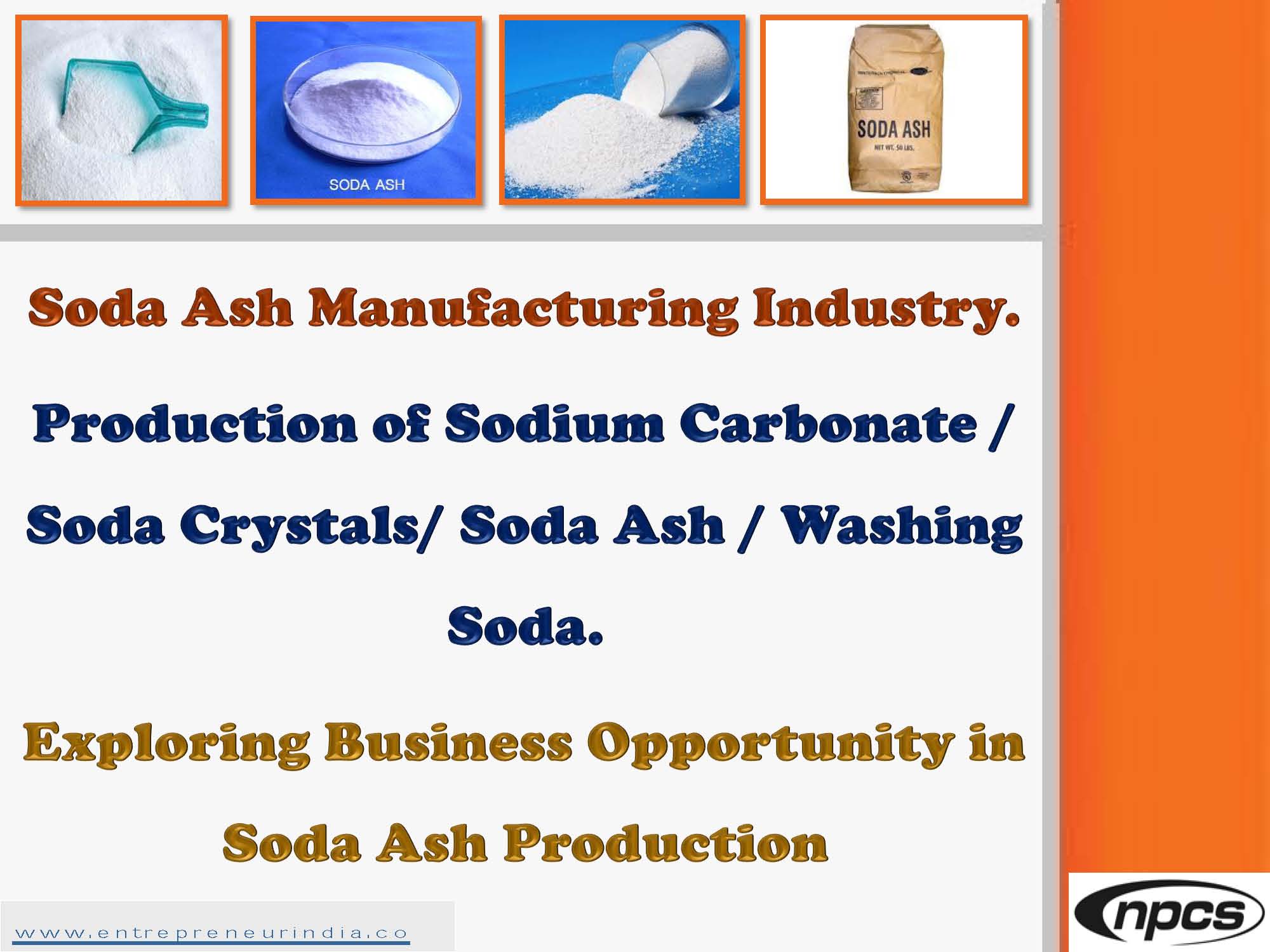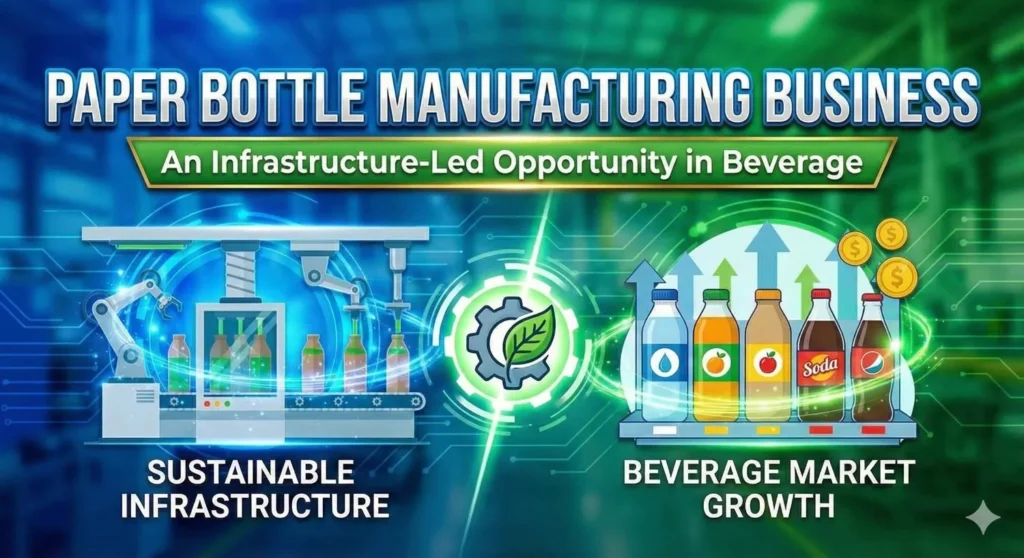
The Soda Ash Manufacturing Industry plays a crucial role in the global chemical market, supplying one of the most essential raw materials used across multiple sectors. Commonly known as sodium carbonate, soda ash is a white, water-soluble compound widely utilized in glass manufacturing, detergents, chemical production, water treatment, and paper making. The demand for soda ash continues to rise steadily with expanding industrial activities, making the Soda Ash Manufacturing Industry a lucrative and stable business for entrepreneurs and large-scale producers alike.
Contents
- 1 Market Overview and Industry Demand
- 1.1 Key Raw Materials Used in Soda Ash Production
- 1.2 Soda Ash Manufacturing Process
- 1.3 1. Solvay Process (Synthetic Method)
- 1.4 2. Mining Method (Natural Soda Ash)
- 1.5 Applications of Soda Ash Across Industries
- 1.6 Machinery and Equipment Required
- 1.7 Investment and Plant Setup
- 1.8 Licenses, Approvals, and Environmental Compliance
- 1.9 Revenue Potential and Profitability
- 1.10 Sustainability and Future Outlook
- 1.11 Conclusion
Market Overview and Industry Demand
The Soda Ash Manufacturing Industry is driven primarily by the booming glass industry, which consumes over 50% of the global soda ash supply. It is a critical ingredient in producing flat glass for buildings, automotive glass, and container glass for food and beverage packaging. In addition to glass, soda ash is widely used in detergents, soaps, textiles, and chemical formulations, particularly sodium silicates and sodium bicarbonate.
With increased construction, urbanization, and industrial growth worldwide—especially in emerging economies—the need for soda ash is growing. Countries like India, China, and parts of Africa are experiencing heightened demand due to infrastructural development and population growth, making the Soda Ash Manufacturing Industry a key economic contributor.
Key Raw Materials Used in Soda Ash Production
Producing soda ash on a commercial scale involves natural and synthetic processes. The main raw materials used in both methods are:
-
Limestone (Calcium Carbonate)
-
Salt (Sodium Chloride)
-
Ammonia
-
Coal or natural gas (for heat generation)
-
Water
In the synthetic process, particularly the Solvay Process, limestone and salt are combined in the presence of ammonia. This method is preferred in areas where trona ore—a naturally occurring mineral rich in sodium carbonate—is not available. The Soda Ash Manufacturing Industry ensures these materials are used efficiently to optimize yield and reduce emissions.
Soda Ash Manufacturing Process
The Soda Ash Manufacturing Industry primarily relies on two production methods, each with distinct advantages and operational considerations:
1. Solvay Process (Synthetic Method)
Manufacturers worldwide widely adopt the Solvay process due to its cost efficiency and established infrastructure. The production steps include:
-
Calcine Limestone: Operators heat limestone to release carbon dioxide gas.
-
Purify Brine: They dissolve salt in water and filter the solution to eliminate impurities.
-
Ammoniate Brine: Technicians bubble ammonia gas through the purified brine.
-
Carbonate Solution: The introduced carbon dioxide reacts with the ammoniated brine to form sodium bicarbonate.
-
Filter and Heat: Workers filter out sodium bicarbonate and heat it to convert it into soda ash.
-
Recover Ammonia: They then recover and recycle ammonia for use in subsequent batches, improving process efficiency.
2. Mining Method (Natural Soda Ash)
Producers in regions with trona deposits use this method to extract soda ash with fewer chemical inputs. The process includes:
-
Mine Trona Ore: Operators extract trona from natural deposits.
-
Crush and Heat: They crush and heat the ore to initiate chemical reactions.
-
Process Extract: They process the heated ore to isolate and refine soda ash.
This method offers a more eco-friendly approach but remains limited to regions with natural trona reserves, such as parts of the U.S., Turkey, and Kenya.
Applications of Soda Ash Across Industries
Soda ash is an incredibly versatile compound, making the Soda Ash Manufacturing Industry relevant to numerous sectors:
-
Glass Manufacturing: Flat, container, fiberglass, solar panels
-
Detergents and Soaps: Enhances cleaning properties
-
Textile Processing: pH control and dye fixing
-
Water Treatment: Softens water and neutralizes acidity
-
Chemical Industry: Base for many sodium compounds
-
Pulp and Paper Industry: Used in bleaching processes
-
Metallurgy: Removes impurities in smelting
Its non-toxic and biodegradable nature also makes soda ash a preferred choice in eco-sensitive applications.
Machinery and Equipment Required
To set up a unit in the Soda Ash Manufacturing Industry, the following machinery and infrastructure are generally required:
-
Rotary Kilns and Reactors
-
Crushers and Grinders
-
Filtration Units
-
Dryers and Calciners
-
Ammonia Recovery Systems
-
Storage Silos
-
Material Handling Systems (conveyors, elevators)
-
Emission Control and ETP Units
Automated monitoring systems and real-time analytics are being adopted by modern manufacturing plants to enhance efficiency and sustainability.
Investment and Plant Setup
Setting up a medium to large-scale manufacturing unit in the Soda Ash Manufacturing Industry involves significant capital investment, typically in the range of ?10 crore to ?100 crore, depending on capacity and location. Key setup requirements include:
-
Land Area: At least 2–5 acres for a full-scale operation
-
Proximity to Raw Materials: Easy access to limestone, salt, and fuel
-
Skilled Labor: For plant operation, quality control, and maintenance
-
Water and Power Supply: Consistent utilities are essential
Small-scale synthetic plants can also be established with modular technology, though scalability becomes crucial for profitability.
Licenses, Approvals, and Environmental Compliance
Operating in the Soda Ash Manufacturing Industry requires multiple regulatory approvals. These include:
-
Factory and Industrial Registration
-
Environmental Clearance from the Pollution Control Board
-
Hazardous Waste Management Certification
-
ISO 9001, ISO 14001 Certifications (recommended)
-
Explosive and Boiler Licenses (if using coal-fired kilns)
Environmental compliance is especially important due to CO? emissions and ammonia usage. Many companies are now installing CO? capture systems and zero-liquid discharge (ZLD) units.
Revenue Potential and Profitability
The Soda Ash Manufacturing Industry offers strong profitability for large-scale producers, especially those catering to international markets. Major revenue streams include:
-
Bulk domestic supply to glass and detergent manufacturers
-
Exports to countries with limited local production
-
By-product sales (e.g., ammonium chloride)
Profit margins vary but typically range from 15% to 25%. Exporters benefit from government incentives like RoDTEP, MEIS, and GST refunds, enhancing bottom-line gains.
Sustainability and Future Outlook
The future of the Soda Ash Manufacturing Industry lies in sustainable innovation. Key trends include:
-
CO? Recovery and Carbon Capture systems
-
Solar drying techniques to reduce energy consumption
-
Green chemistry for ammonia recovery
-
Digital control systems for reducing waste and enhancing precision
-
Increased use of trona ore mining for eco-friendly soda ash
With growing demand from solar panel and fiberglass sectors, and expansion of green buildings and EV infrastructure, soda ash will remain indispensable in industrial value chains.
Conclusion
The Soda Ash Manufacturing Industry is a foundational pillar in global manufacturing, supporting countless downstream sectors from construction and chemicals to FMCG and energy. As industrialization continues to rise globally, especially in emerging economies, soda ash remains in steady demand. With strategic investments, eco-conscious production methods, and strong quality assurance, businesses can thrive in this sector for years to come.
Niir Project Consultancy Services
An ISO 9001:2015 Company
106-E, Kamla Nagar, Opp. Spark Mall,
New Delhi-110007, India.
Email: npcs.ei@gmail.com , info@entrepreneurindia.co
Tel: +91-11-23843955, 23845654, 23845886, 8800733955
Mobile: +91-9811043595
Website: www.entrepreneurindia.co , www.niir.org




